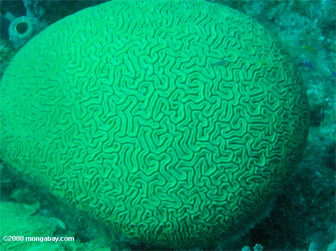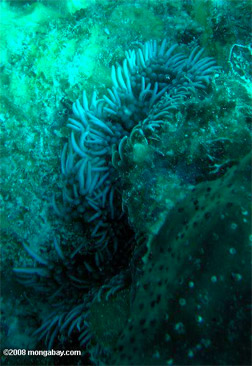Fleshy whorls of thick brown algae blanket the once-vibrant corals in Glover’s Reef, Belize. According to a controversial study published August 14 in the journal Coral Reefs, a decade of marine reserve protection has failed to help these damaged Caribbean corals recover.
Healthy reefs depend on herbivorous parrotfishes to gobble up vast algal blooms. When fishing pressures overwhelm these seaweed-grazing species, tough carpets of ropy algae choke new coral growth.
Research has shown that marine reserves with strong ‘no-take’ enforcement—armed patrols, clear boundaries and daily surveillance—can protect herbivorous fish populations. However, it’s less clear whether these safeguards also help corals bounce back.
 Brain corals off the coast of Belize can grow up to 6 feet high. Photo by: Rhett A. Butler |
In 2008-2009, researchers from the University of Miami counted herbivorous fishes and measured coral growth at 87 reserved and fished sites throughout Glover’s Reef. Then, they compared their results to data collected in 1998-1999. They showed that the reserves made no difference in fish populations or coral health.
Marine scientist and lead author Brittany Huntington thinks it’s important to challenge the assumption that marine reserves invariably promote coral recovery. “We need to do a better job of understanding where reserves work and where they don’t,” she told mongabay.com. “The failures are just as important to hear as the success stories.”
But the findings at Glover’s Reef shouldn’t count as a failure, contends Peter Mumby, a marine ecologist at the University of Queensland in Australia. Mumby published a 2010 paper in PLoS ONE concluding that marine reserves do help Caribbean corals recover.
 Coral reefs off the coast of Belize are home to thousands of different species, such as this purple sea anemone. Photo by: Rhett A. Butler |
“If you’re going to study marine reserve impacts on coral, then you need a marine reserve that is actually doing something,” Mumby said in an interview with mongabay.com. Because the reserve at Glover’s didn’t affect fish numbers, he’s not surprised that corals didn’t recover. He thinks parrotfish poachers may still be plundering reserves, despite beefed-up enforcement by the Belizean government.
Both Mumby and Huntington acknowledged that different reef environments could account for the different study outcomes: he looked in the Bahamas, she in Belize. However, Mumby thinks it’s misleading to conclude that reserves don’t benefit corals.
He said environmental stressors during the study, such as hurricanes and unusually warm waters, could have obscured coral recovery at Glover’s. Mumby thinks Huntington’s paper might send a false message that marine reserve science is murky or inconsistent.
But Huntington believes Glover’s is an ideal place to document that reserves can work for some species (like conch and lobster) while not for others (like fish and corals). She envisions a multi-pronged management approach to help Caribbean corals cope with environmental and human-inflicted hazards. This might mean merging traditional strategies with more experimental ideas, such as physically transplanting healthy corals onto damaged reefs.
Already, the absence of algae-munching fish at Glover’s has shifted the balance of coral species from the massive “broadcasters” that tower above the ocean floor and build the framework of the reef to the runty “brooders” that sprout like underwater weeds.
Shrimp, starfish, and thousands of other sea-dwelling species depend on colossal reef structures for housing and meals. “If we lose our big builders,” Huntington said, “how can we expect to have healthy, structurally complex reefs in the Caribbean?”
CITATIONS: Huntington BE, Karnauskas M, Lirman D. Corals fail to recover at a Caribbean marine reserve despite ten years of reserve designation. Coral Reefs, 14 August 2011. DOI: 10.1007/s00338-011-0809-4
Mumby PJ, Harborne AR. Marine reserves enhance the recovery of corals on Caribbean reefs. PloS One. 11 January 2010. DOI:10.1371/journal.pone.0008657
Meghan D. Rosen is a graduate student in the Science Communication Program at the University of California, Santa Cruz.